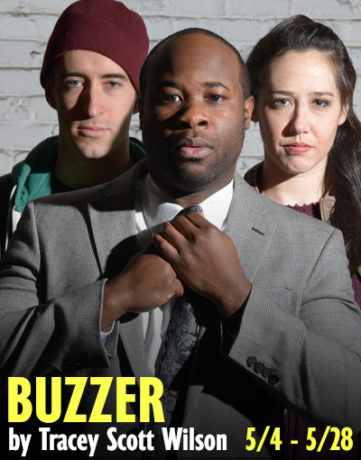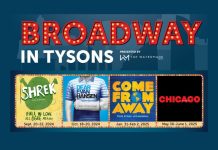Theatre Exile closes its 2016-17 season with Tracey Scott Wilson’s searing drama Buzzer, which examines issues of race, class, and gender through the lens of urban gentrification. Directed by Matt Pfeiffer and featuring three of Philadelphia’s busiest and most accomplished young actors – Akeem Davis, Alex Keiper, and Matteo Scammell – the play focuses on the increasingly tense inter-relationships, backstories, and attitudes of Jackson (a hard-working upwardly-mobile black lawyer, educated at Exeter and Harvard), his girlfriend Suzy (a white schoolteacher with a modest income), and his long-time friend Don (a recovering addict from a privileged white family), who all move into the large upscale apartment Jackson just purchased in a newly rehabbed building, seeing it as a “great investment” in the now-transitional neighborhood where he grew up.
On a very long day for them, prior to an afternoon rehearsal and an evening preview performance, the lead actors enthusiastically spoke with me about the theme, their views of the characters, and the crafting of their outstanding performances.
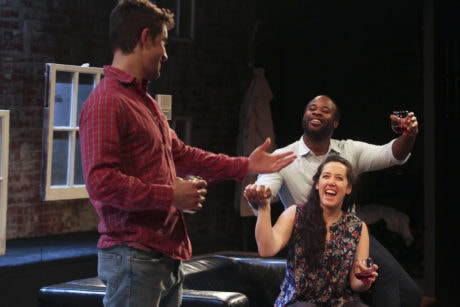
Deb: Why should audiences see Buzzer?
Alex: Hmm. Hmm.
Matteo: It’s so fucking good! It’s a really, really smart play by a really intelligent woman. You should see smart work.
Akeem: It’s a conversation I want to be having about the cultural and social impact of economics and the interactions of types in terms of friendships, romantic relationships, tensions. That’s why theater is effective, because it does Types of characters, and this play manipulates our Types to ask questions about identity, self-worth, origins, and the narratives we create for ourselves. It makes us ask what is real about ourselves and what barometer do we use to determine what is real.
Alex: One of the things Matt said is that this won’t change the world’s view; it’s posing questions without giving clear-cut answers. That’s what makes it different and exciting.
Matteo: We’ve had conversations with the audience after the previews, and an older white man said to Alex as we were leaving that she should be careful out there. I couldn’t tell if that was the result of his having just seen the play, or if that is his attitude. Another white man told me he liked my character the best because he overcame drug abuse. But in this play, no one gets out or is completely safe. No spoilers here, but there are consequences and surprises at the end.
Alex: Our journeys are never done; we need to figure out how to move forward.
Matteo: Where do they stand at the end of the play? That says a lot about our culture.
Akeem: The questions in the text are important, but anyone could read that in a philosophical essay. What makes it a good show is that the three of us are delivering high acting values with Matt driving the team. The space also contributes to the power of the show. It’s in a horizontal configuration as it was for The Whale, so it’s long and wide and close to the audience. The audience is in the space with us, so it gives us the chance to access smaller, more intimate, and more specific acting. After our first preview, Matteo came back into the dressing room shaking his head saying, “You can’t lie out there!” Just a foot and a half away from the audience, we all feel that.
Matteo: You can see the whites in their eyes.
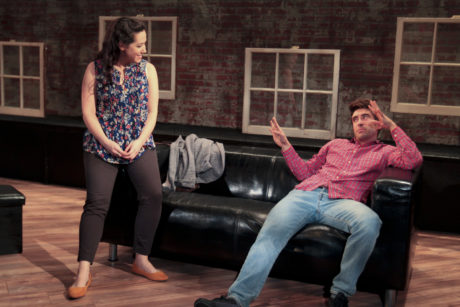
What do you empathize with in your characters?
Alex: With Suzy, we see her struggling with her role as a partner pretty early on. She wants to be supportive, but she can’t always share what she’s feeling or the problems she has. I understand the fear and the desire to make things okay, it’s something that women traditionally have been expected to do, though I myself am pretty vocal.
Matteo: They’re all really trying to do what’s right, and in some ways that’s their undoing. It’s hard not to have a counter-argument to that, and that’s what’s so great about Tracey’s writing. My character, Don, is from a privileged background, he can buy his way out of anything, so am I sympathetic to that? But I do see that he’s trying.
Akeem: I am so critical of my character, there’s only one thing I can empathize with: that he’s a black person trying to navigate; people love black culture but hate black people. Jackson grew up in the projects in New York, stacked up on top of his neighbors, left to his own devices, so I can empathize with that. As a black man, trying to accept the way of the world is like making peace with someone who has abused you, who doesn’t always have your best interests at heart. Ever. I know that trauma, so I can’t judge Jackson. I give him the room to cope however he needs to.
Is there anything your characters do that you wish they didn’t?
Akeem: One of my attractions to the role was that I don’t agree with him and I wish he would have made better decisions. There’s so much at stake here, he stands to lose a lot with the different choices he makes and I think he does. I think Jackson earns everything that comes to him by the end of this play. He thinks he’s insulated, but he’s not; you can’t change your origins, reality will be the final arbiter. Jackson tries to fix issues by managing them, not addressing them. It doesn’t work, and then he falls into some pretty classic pitfalls.
Alex: Jackson is trying to cope any way he can. Don is doing the same with his addictions, and Suzy, as a woman, experiences a different kind of fear and pain and suffering. We all deal with it how we can; it’s not simple, but it’s honest.
Matteo: I wish Don didn’t decide to be closed off in entirety from his father. You have to embrace where you came from. Jackson is in denial, but he still knows, and he’s not wrong. Don is not wrong to want to eliminate the privilege from his life, but he should see that he could use it to better advantage.
Akeem: I wish Jackson didn’t move, didn’t go back to his old neighborhood! He embraces where he came from, but the impurities complicate it; it’s impossible not to engage with the harsher elements. But if he doesn’t move back home, we don’t have a play! He lost the idea of who he is, makes missteps without knowing it. Even as I’m saying that, I recognize that I’m managing a problem instead of correcting it; that’s different than saying that the move gave Jackson a chance to look at himself in the mirror and to learn something.
Matteo: You see both sides. With Matt, you can see it from the outside, as well as from the inside through our characters; and that feeling can change every night.
Alex: We get to have the conversations they didn’t, but should have.
Akeem: I had a conversation with a married friend about relationships. I asked him, “What about the days when you’re not feeling it, but you can’t be mean?” He said, “The things you don’t want to say are the things you have to say.” You take the major issues head-on, you have to address them. We don’t discuss them head-on in Buzzer.
Matteo: Don says, “Let’s talk about it.” Suzy says, “Talk about what?” And every time they might start a real conversation, the door buzzer gets in the way, or a cell phone goes off; they’re always interrupted.
Akeem: The writing is so good. My character’s first and last lines are complete opposites. You see the journey of the characters, and it’s apparent, but the ending still sneaks up on you.
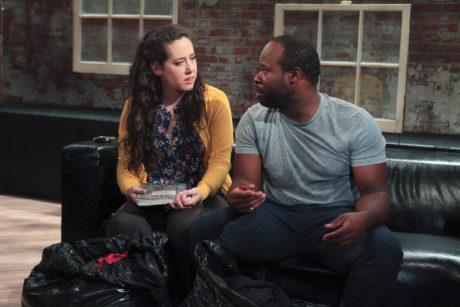
So to some extent, do you see the theme as a reaffirmation of the sentiment expressed in the title of Thomas Wolfe’s novel You Can’t Go Home Again?
Akeem: I have never read that book, so I wouldn’t know the themes it presents. I will say, in Kendrick Lamar’s album To Pimp a Butterfly, he has a song – “Institutionalized” – that deals with the conundrum of success: deciding to embrace your origins, or to forsake them.
How does Buzzer fit with Exile’s signature style of being “gritty” and “provocative”?
Matteo: I promise to cut off my pinky.
Akeem: There’s cursing, fighting, sex, blood, heated conversations. The play makes people uncomfortable.
Matteo: On purpose.
Alex: It’s meant to throw something up to see how it lands, if it lands, and what you do with it. The conversation can’t end with the play, and it won’t end.
What does Matt Pfeiffer bring to the production, as one of the most respected directors in Philadelphia?
Alex: He understands realism; it’s where his passion is, even though he’s done so much different work. But no matter what he does, it’s all about playing the action moment and identifying it.
Matteo: He brings clarity, great intelligence, and sensitivity. He knows when to trust his instincts, when to trust his actors, when to step back, and when to listen to the audience. He pushes me out of my comfort zone sometimes, and that’s good.
Akeem: When I was doing The Brothers Size at Simpatico, James Ijames was directing, and he said, “You have to unpack the play to act the play.” You have to understand the story, and Matt has reminded me that lines, movements, intentions without purpose mean nothing. I need to receive from Alex and Matteo, and I need to transfer my information to them. We always need to tie things to purpose. What do you want? What are your goals? It’s hard, but it’s efficient. I’m naturally contentious – don’t hire me if you don’t want to hear me! – but Matt has thick skin, so when we had conversations that were very passionate, he was ok with that. He invites it, and we went there and bounced back. It makes me want to listen more when I feel I’m being listened to. Honestly, I was nervous about rehearsal, that I might say something that would offend these white people. I’ve done it before, and those relationships haven’t come back yet. But this play needs those conversations, and we’ve learned from them. And nobody hates anybody.
Alex: It’s exciting to have a conversation about how the things that happen in the play happen in the real world.
Akeem: And Matt didn’t shut anybody down, but tied the discussions to the play and saw how they could be useful, which is always impressive. Some of the conversations even worked with other later parts of the play that we hadn’t gotten to yet.
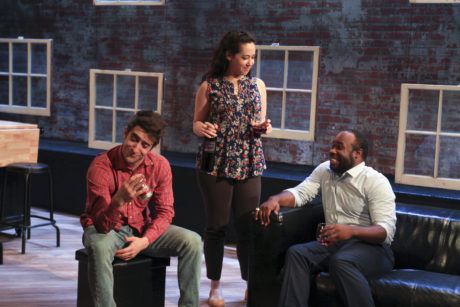
What are your dynamics on stage and off? Have you worked together before, or are you just getting to know each other for the first time here, while defining these intense characters?
Akeem: I’ve never worked with Alex or Matteo, and it’s been great. They’re my peers and they’re obviously doing so well for themselves. Whenever I work with artists I respect, I look to create the dynamic of sharpening knives. I got better from working with them, and Matt as well. This was my first process as a featured actor with Matt. Each of them – Matteo, Alex, and Matt – carry themselves with a confidence and readiness that’s really good for me to face, on stage and off. I’ve enjoyed myself.
Alex: I’ve now worked with Matteo three times but this is my first time working with Akeem, though we’ve been hoping to work together for a while. Glad the first one was such an exciting and challenging process. Both of these guys challenge me to stay grounded and present. We disagree, but that can be fun, when you trust your scene partners.
Matteo: I think our dynamics are excellent both on stage and off. We’re friends in the dressing room, with histories and passions and gripes and perspective. And it’s not dissimilar onstage. It’s been excellent working with such fantastic actors. Their standard of excellence is high and it pushes everyone to do better work – more committed, deeper listening – so ultimately what I think I’m saying is that there’s chemistry and trust. Trust is an essential aspect of friendship. I’ve worked with Alex a few times before this; we did Cinderella at the Arden and before that we did a reading of Bloody Bloody Andrew Jackson with 11th Hour. We worked most recently on Hand to God at PTC [Philadelphia Theatre Company], which Matt also directed. I’d never worked with Akeem, but I’ve admired his work for some time, and he’s great to work with. Part of the work of an actor is about defining yourself with respect to your castmates. We got into some verbal disputes in rehearsal, but never about each other, always concerning the work.
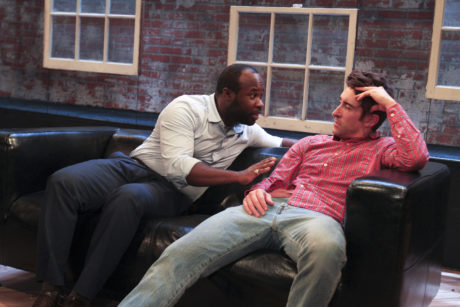
What are the challenges of doing a work like Buzzer, with such current hot-button issue?
Akeem: No challenges; I want to be having these conversations. I’m not interested in chasing news stories, in being bound to the moment, but, what is theater if it doesn’t speak to our times? Race, gentrification, romance, sex, money . . . they’ll always be hot-button issues. We have to engage with them though.
Alex: We all faced the challenge of wanting to judge our characters and their choices at first, and I’m sure that experience will be shared by the audience. It’s not our job to apologize for those choices, but more to help the audience understand how we all make some destructive decisions – to show the character’s humanity, which isn’t always pretty.
Matteo: You don’t want to be wrong. We want to be right and assured in our actions, our beliefs, our perspective. But when it comes to a hot-button issue like racism, classism, or gentrification, people end up being wrong, and that’s just plain hard. I know a big challenge has been to craft an articulate and compelling argument for each of the characters. For us, as actors, to make choices in Buzzer that appear easy or general is to do a grave disservice to the excellent craftsmanship of Tracey Scott Wilson. If you’ve seen “The People v. O.J. Simpson,” then you know what I mean. We owe it to Tracey, to each other, to the audience, to Exile, to the victims of gentrification, to be as specific and detailed in our work as possible.
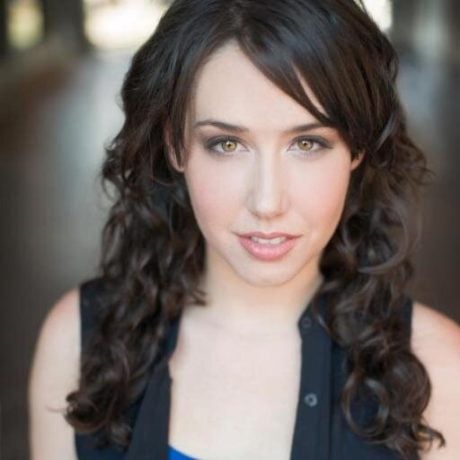
You’ve all done a variety of genres, from the classics and period pieces to musicals, contemporary shows, and new work. Which is your favorite?
Alex: Realism feels the most natural for me, but it’s fun to do shows that are less weighty. I love the variety, and hope I’ll be able to continue to do it all, but realism is a true response, and that’s always exciting – to act like you probably would in real life in that situation.
Akeem: All I can do is realism; I can’t dance or sing! Everything I do, from Shakespeare to this, is realism.
Matteo: Right now I feel like my favorite is something I’ve always wanted to do, but haven’t; the thing I’m most afraid of, like a farce, with wigs and door slamming – heightened realism.
Akeem: I did Unnecessary Farce at Act II, and I loved it! But my approach was always realistic.
Alex: The stage level of realism is baseline, and farce is one step above baseline. The baseline is truth, and style tells us how far above the baseline we should build. Farce is way above the baseline, but still grounded in truth.
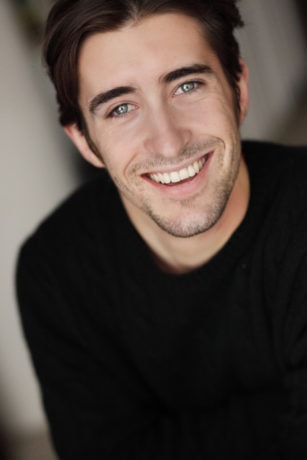
What’s your first creative memory?
Matteo: My grandmother loved dollhouses. She built them and furnished them, and to some extent collected them. When I was three or four years old, we moved from New York City to live at my grandmother’s house in New Jersey. My room, where my dad grew up as a kid, was basically the attic and my grandma had a couple of houses up there. I remember opening the front of that dollhouse and just yearning, aching to fill that space with living people, with little animated living breathing things that could walk up the stairs and sit in the chair and drink the tiny Coke bottles. If you can even call it creative, I would imagine myself living in that house, inhabiting the space. That feels like my first memory of actively using my imagination to be in two places at once, of transforming the space in front of me by using my imagination. The other, maybe more official memory, is going to dance class at the Mill Ballet School in Stockton, NJ. I was probably six at that point and they asked us to make up a scene to music. I went home and busted out the only CD I owned, which was the Space Jam soundtrack, and the song I picked was Spin Doctors’ “That’s The Way.” The lyrics are “that’s the way (uh-huh, uh-huh) I like it,” and in my scene I pretended I was going to a diner to eat some soup; and when I ate it, the chorus came in. Boom.
Alex: When I was about five, my dad asked me if I wanted to start working on my acting skills. He was an actor and said that he could tell I had the same connection to it that he did. The first thing I remember working on with him was an Anne Frank monologue. He taught it to me and I remember crying in our living room as he told me about what happened to her. After understanding why it was so important to tell her story, I wanted to make sure every moment felt like it was completely real. He helped me with memorization, language, connection, and clarity. This started a life-long conversation with my dad about acting and truthful storytelling.
Akeem: I performed a poem called “Be a man, boy, be a man,” in a Theodore Gibson Oratorical Competition in the third grade. Memorization and vocal energy came extremely natural to me. That was my first performance of any kind that I can remember. It introduced me to the idea of dramatic interpretation. I’m sure it was a very simple performance, but it’s something I always go back to.
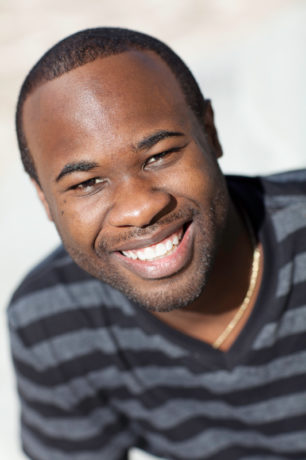
What’s next on your schedule after Buzzer?
Matteo: I’m doing some play workshops with the Hothouse next week. Kate Tarker is in town and she’s a great playwright who has written a fantastic piece; we’ll be putting that through its paces. This summer New Paradise Laboratories is back in the lab cooking up something tasty for the Fringe Festival. It’s a premier, and we’re working with Bhob Rainey, who is a wild composer and programmer, and, in my opinion, something of a genius; he’s doing some devastating things with orchestral instruments. After that I’ll be doing Blood Wedding at The Wilma with Hungarian director Csaba Horváth.
Alex: Next season, I’ll be working on Michael Hollinger and Robert Maggio’s new musical TouchTones, upstairs at the Arden; that starts performances in October. Then I’ll be playing Brigid in the Walnut’s production of The Humans, opening in January 2018.
Akeem: In August, I start rehearsal for The Arsonists by Max Frisch at the Wooly Mammoth Theatre in DC. It will be my first time working at that house, so I’m excited about it. I’ll be out there from August to mid-October. In December, I start rehearsal for A Doll’s House at the Arden.
Many thanks to all of you for your time, and for sharing your substantive insights into the play, its characters, and the very real socio-economic issues that are addressed in Buzzer.
Running Time: Approximately 90 minutes, without intermission.
Buzzer plays through Sunday, May 28, 2017, at Theatre Exile, performing at Studio X – 1340 South 13th Street, Philadelphia, PA. For tickets, call (215) 218-4022, or purchase them online.


